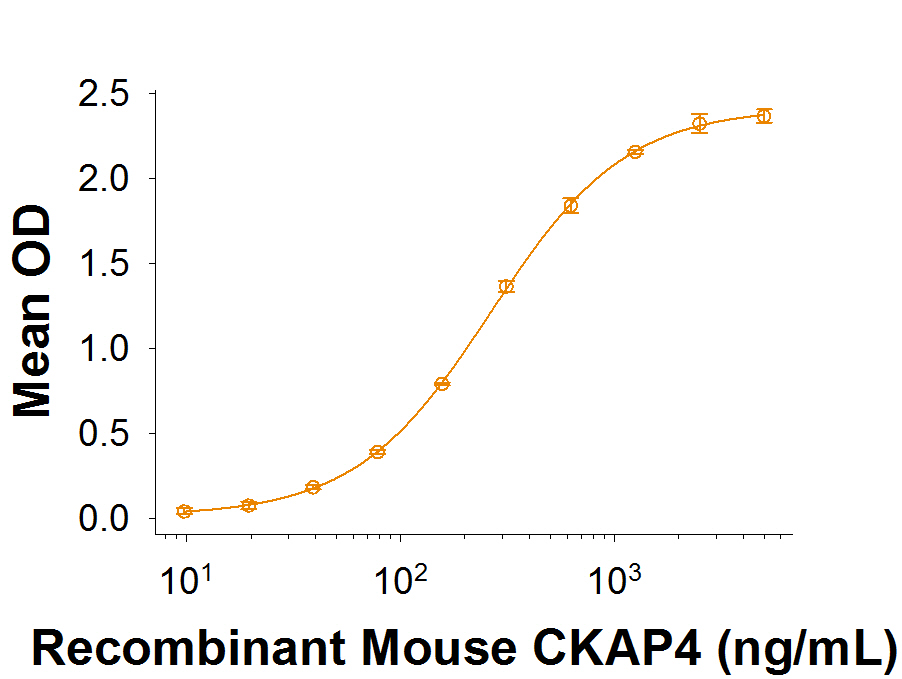Recombinant Mouse CKAP4/p63 Protein, CF Summary
Product Specifications
Val109-Ile575, with an N-terminal 6-His tag
Analysis
Product Datasheets
Carrier Free
CF stands for Carrier Free (CF). We typically add Bovine Serum Albumin (BSA) as a carrier protein to our recombinant proteins. Adding a carrier protein enhances protein stability, increases shelf-life, and allows the recombinant protein to be stored at a more dilute concentration. The carrier free version does not contain BSA.
In general, we advise purchasing the recombinant protein with BSA for use in cell or tissue culture, or as an ELISA standard. In contrast, the carrier free protein is recommended for applications, in which the presence of BSA could interfere.
9734-CK
| Formulation | Lyophilized from a 0.2 μm filtered solution in PBS. |
| Reconstitution | Reconstitute at 500 μg/mL in PBS. |
| Shipping | The product is shipped with polar packs. Upon receipt, store it immediately at the temperature recommended below. |
| Stability & Storage: | Use a manual defrost freezer and avoid repeated freeze-thaw cycles.
|
Scientific Data
 View Larger
View Larger
When Recombinant Mouse Dkk-1 (Catalog # 5897-DK) is immobilized at 1 µg/mL (100 µL/well), Recombinant Mouse CKAP4/p63 binds with an ED50 of 35-280 ng/mL.
Reconstitution Calculator
Background: CKAP4/p63
CKAP4 (Cytoskeleton-associated protein 4; also CLIMP63 and p63) is a 63-64 kDa molecule that belongs to no known protein family. It is found intracellularly, and on the plasma membrane of select cells such as vascular smooth muscle and Type II Greater alveolar lung cells (1). CKAP4 has a bimodal distribution. First, it is embedded in the membrane of a compartment that links the ER with the Golgi apparatus (2). This localization is dependent upon its ability to form homooligomers, and its presence serves to anchor microtubules and direct the formation of tubular ER. Second, it is embedded in the plasma membrane and serves as a receptor for SP‑A/surfactant protein-A (in lung) (2) and tPA (in vessels) (3). Mouse CKAP4 is a 575 amino acid (aa) type II transmembrane nonglycosylated protein. It contains an 85 aa N-terminal cytoplasmic region plus a 467 aa C-terminal luminal domain (aa 109-575) (4). The luminal domain contains three coiled-coil regions (aa 125-193; 236‑438; 507-575) plus three utilized phosphorylation sites (5). CKAP4 undergoes reversible palmitoylation (6). Over aa 109-575, mouse CKAP4 shares 82% and 94% aa sequence identity with human and rat CKAP4, respectively. CKAP4 has been shown to be required for APF-mediated signaling (6-9), for gentamycin-induced cytotoxicity (8), for regulation of tPA function (3), and for SP-A-induced surfactant uptake by pneumocytes (10). CKAP4 interacts with Dickkopf-1 (Dkk-1) to promote activation of AKT-dependent, Wnt-independent signaling(11). Both CKAP4 and Dkk-1 are frequently up-regulated in pancreatic and lung cancers (11). Dkk-1 binds to CKAP4 with high affinity that is comparable to but independent of its interaction with LRP5/6 (11).
- Bates, S. R. et al. (2008) Am J Physiol Lung Cell Mol Physiol, 295:L658.
- Gupta, N. et al. (2006). Am J Physiol Lung Cell Mol Physiol 291:L436.
- Razzaq, T. M. et al. (2003). J. Biol. Chem. 278:42679.
- Schweizer, A. et al. (1994). J. Cell Biol.126:25.
- Huttlin, E. L. et al. (2010) Cell 143:1174.
- Planey, S. L. et al. (2009). Mol Biol Cell. 20:1454.
- Conrads, T.P. (2006) J Bio Chem, 281:49.
- Matika, C.A. (2012) Mol Bio Cell, 23:10.
- Shahjee, H.M. (2010) J Exp and Clin Cancer Res, 29:1.
- Kazi, A.S. (2010) Am J Physiol Lung Cell Mol Physiol 299:6.
- Kimura, H. et al. (2016) J Clin Invest, 126:2689.
FAQs
No product specific FAQs exist for this product, however you may
View all Proteins and Enzyme FAQsReviews for Recombinant Mouse CKAP4/p63 Protein, CF
There are currently no reviews for this product. Be the first to review Recombinant Mouse CKAP4/p63 Protein, CF and earn rewards!
Have you used Recombinant Mouse CKAP4/p63 Protein, CF?
Submit a review and receive an Amazon gift card.
$25/€18/£15/$25CAN/¥75 Yuan/¥1250 Yen for a review with an image
$10/€7/£6/$10 CAD/¥70 Yuan/¥1110 Yen for a review without an image
